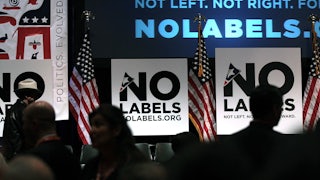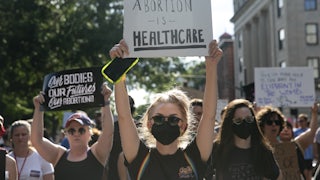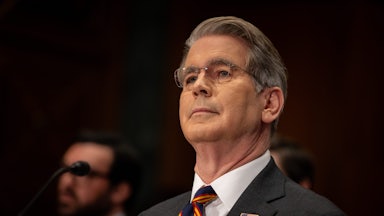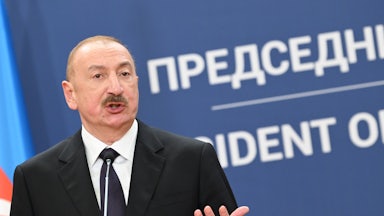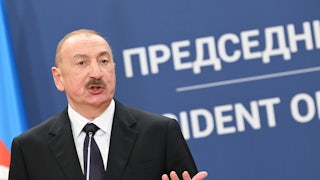Earlier this month, the self-described moderate outside group No Labels wanted everyone to know that another governor had joined its ranks: former North Carolina Republican Governor Pat McCrory. In an email invitation to supporters, former Senator Joe Lieberman and Dr. Benjamin F. Chavis—No Labels’ founding chairman and its national co-chair, respectively—wrote that McCrory would help the group “communicate our message to the tens of millions of Americans who are looking for a new approach to national leadership.”
For his part, McCrory said, “The two parties are failing” and told The Charlotte Observer that his real motive for joining No Labels was to bolster the group’s plans to set up a “launching pad” for a 2024 “unity ticket” of one Republican and one Democrat. He described former President Donald Trump and President Joe Biden, the two candidates likely to be in the 2024 general election, as “two candidates that most people don’t want.”
No Labels has worked to bring in both Republicans and Democrats under its banner. The results have been predictable. The big names associated with No Labels are almost always the same type of Democrat or Republican: moderate-to-conservative Democrats like Lieberman and West Virginia Senator Joe Manchin, the (relatively) moderate Republican Senator Susan Collins of Maine, the more liberal former Maryland Republican Governor Larry Hogan. All of these lawmakers held some sort of moderate identity that pitted them at the very edge of their respective party.
McCrory, though, is different. He is an undeniable conservative whose tenure as governor of North Carolina was marked by a highly ideological agenda. He was so controversial that his term in office—and there was just one; he’s the only governor going back to the 1800s to run for a second term and lose—sparked the famous Moral Mondays protests, led by the Reverend William Barber. Even today, McCrory’s name elicits frothing anger from Democrats.
“The best way I could say it, his governorship will go down as one of the most disastrous in North Carolina history,” said North Carolina Democratic strategist Morgan Jackson. “It was marred by scandal, corruption, and, frankly, incompetence long before he made North Carolina the laughingstock of the world with H.B. 2.”
Trey Nix, another Democratic strategist, who advised current North Carolina Governor Roy Cooper, said, “Pat McCrory was one of the most partisan governors in North Carolina history. His politics are cynical and self-centered, and no one is more comfortable playing the victim and acting aggrieved than he is.”
McCrory defended voter ID laws. Under McCrory, North Carolina rejected the Obamacare Medicaid expansion, passed new tax laws benefiting the wealthy, watered down campaign finance laws, and implemented a restrictive abortion law, breaking McCrory’s campaign pledge not to do so. MSNBC described North Carolina during the McCrory administration as taking “a hard-right shift.” And it all culminated in House Bill 2, the one Jackson cited, which required people to use bathrooms that aligned with the gender on their birth certificate, essentially curbing trans rights. That bill had numerous negative ramifications for the state, most notably including the NBA’s decision to yank the All-Star game out of Charlotte in 2017.
Since McCrory lost reelection, he’s been working to portray himself as some sort of higher-than-thou moderate who is disgusted by Trump and rank partisanship on both the left and the right. But in 2022, during his ill-fated run for the U.S. Senate, the former governor described himself as the target of both liberals and conservatives. “I was probably the original person who was canceled, and now I’m the one being called a liberal,” McCrory told Politico. “Someone came up to me the other day and said, ‘McCrory, you were DeSantis before DeSantis.’ I said, ‘That’s a unique perspective.’ I stood up to some things that were contrary to not just liberals but to the power elite of my party.”
McCrory ended up getting trounced by now Republican Senator Ted Budd in that primary. Budd, who had Donald Trump’s endorsement, successfully framed the former governor as a Republican in Name Only, despite McCrory’s undeniably conservative record.
No Labels is now embracing that portrayal. On Thursday, the group hosted a Zoom meeting to introduce McCrory to supporters. It was a bizarre online debutante ball for McCrory’s addition to the No Labels community. It started with a song from Canadian singer Deborah Cox about unity. Ahead of McCrory’s remarks, Lieberman, Hogan, Manchin, Collins, Republican Senator Bill Cassidy, Republican Congressman Tony Gonzalez, and Democratic Congressman Henry Cuellar all taped tributes hailing the former North Carolina governor joining the group.
When I emailed No Labels seeking comment, they opted to put me on the phone with Chavis and McCrory, alongside a spokesperson. They reiterated their points—that this was not about attracting moderates, it’s about building a coalition of moderates, liberals, and conservatives—and that No Labels did not plan to prop up a unity ticket if it would help Trump get elected (they refused to say if it mattered whether such a ticket would help another Republican presidential candidate get elected).
“No Labels comprises liberals, conservatives, Republicans, Democrats, and independents,” Chavis said. He went on to say, “I’m a native North Carolinian, I’m a lifelong Democrat, and I’m a liberal. But I’m co-chair of No Labels, and I welcome Governor Pat McCrory as a conservative Republican.”
At another point during this follow-up interview, McCrory argued that although he is a conservative who endorsed Trump, he strongly opposes Trump’s candidacy. McCrory said the January 6 mob attack on the Capitol was a big factor in changing his mind about the forty-fifth president—he didn’t cite any of Trump’s positions or actions during that presidency as a major factor.
It’s clear that No Labels’ leadership is eager to trumpet McCrory’s new position as a national co-chair.
“So we’ve got now Hogan, McCrory, Chavis, and Lieberman. There’s a balanced ticket for you with a lot of strength,” Lieberman said in his remarks on the Zoom call. “Pat really adds value to this movement of ours at a time when we really need it. No Labels has never been more important to our country in trying to break the partisan gridlock in Washington that has stopped our government from solving problems for the American people.”
Lieberman went on to point to the project that’s drawn McCrory to the organization. “At this moment … No Labels has probably attracted more attention than ever before because we are working hard to qualify for a third ticket line on all 50 state ballots, in case we decide that America is ready for—and needs—a bipartisan national unity ticket in 2024 to give the American people a hope of breaking out of the partisanship and gridlock that exists now,” he said.
When it was McCrory’s turn to talk, he offered some fairly bland platitudes about the importance of No Labels. But then he also said, “I think there’s a kind of an arrogance of the two parties just kind of assuming we’ll accept whatever they have to offer us. And this is coming from a Republican and a conservative. We can’t accept the status quo because now is the moment of the time in our country when the status quo is not acceptable.”
The comment was telling. Even after all the praise of McCrory as some kind of bipartisan bridge builder during a live No Labels event, he still describes himself as a conservative. Not a moderate Republican, a conservative Republican. Because he is. And No Labels clearly knows what he’s doing there—Lieberman outright said it. McCrory is there to help the No Labels 2024 presidential campaign unity ticket project. The group has maintained again and again that the effort is not about helping to elect Donald Trump, but the data shows such a ticket would actually help boost Trump into the White House again. For a conservative such as McCrory, that’s pretty appealing.

